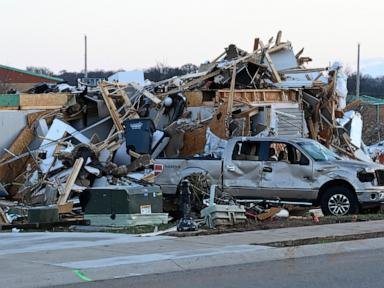Floods, fires, historic storms — severe weather events are on the rise. If your home was hit by high water or a wildfire, would your important papers be safe?
“Unfortunately, I’ve had clients who’ve been victims of fires, flooding, hurricanes,” says Sev Tamayo, an agent with Goosehead Insurance in Palm Coast, Florida. “Some of them were prepared and some of them weren’t.”
Don’t be unprepared. Here’s what you need to do to protect your important documents.
WHAT YOU SHOULD KEEP SAFE
The most important items to keep in a safe place are things that are difficult to replicate, which includes documents that prove identity, legal process or ownership. If you’d have to call a government agency to process a replacement, you probably want to store it somewhere where it can stay damage-free. You should also consider what you’d need to access if a disaster strikes.
Here are some items to consider, according to the Federal Emergency Management Agency:
—Birth, adoption, death, marriage and divorce certificates.
—Passports, green cards and Social Security cards.
—Property documents pertaining to your home or rental properties, mortgage or lease, and vehicles.
—Pet ownership paperwork.
—Paper stock and bond certificates.
—Military discharge papers.
—Health records, health insurance information and disabilities documentation.
—Estate planning documents (powers of attorney, wills, advance directives and trust agreements).
—Property insurance documents, including policy numbers and declarations pages.
— Tax records.
—Financial statements (loans, credit cards, banks, retirement accounts and investment accounts), as well as income records (pay stubs and government benefits).
—Copies of driver’s licenses and other IDs, health insurance cards and credit cards.
—Family photos or heirlooms.
(For a complete checklist, visit ready.gov.)
STORE COPIES IN THE CLOUD
“It’s also a good idea to keep scans of your critical documents, as well as backups of all your computer files on a storage device at a separate location, or in the cloud,” said Pete Duncanson, senior director of training and development at ServiceMaster Restore, a restoration service company, in an email.
In some cases, a copy of a document will suffice in an emergency. This doesn’t mean you shouldn’t keep the original — but if you lose the original, you may be able to get by with your digital copy.
You can take a photo, scan a document or create a PDF of an online statement, and use a cloud service like Google Drive or Dropbox for storage. If you use an external drive, keep that somewhere safe as well.
THE VIDEO YOU SHOULD MAKE
If you need to file an insurance claim, your insurer will need proof of what you owned. Keeping a record of your things is tedious — but you probably have a smartphone with a camera.
“Start from the front door, turn on the video camera, take a quick two-minute walk around your house,” Tamayo says. “Save it on the cloud.”
Do this once a year. Let your insurance renewal be your cue, or set a calendar reminder — and refresh it when you’ve made a major purchase or renovation. “You want to get credit for the newest things that you have,” Tamayo says.
WHERE TO KEEP YOUR DOCUMENTS
Store important documents in a container that makes the most sense for your particular risks with an eye toward preparing for the unexpected. Here are some options:
— Fireproof safe: You can get a fireproof safe box for under $50, but keep in mind that they come in a variety of sizes and temperature ratings. Some are waterproof. Some are more portable than others. Putting items into a zip-close bag or waterproof container inside a fireproof safe can provide double protection.
— Safe deposit box: A safe deposit box at a bank can weather a lot of events. But don’t put anything there that you might need in a hurry — such as a passport for a last-minute trip — or anything someone would need in the event of your death, such as your estate documents. “If a family member isn’t on the box, that box has to go through full-blown probate just to get stuff out of the box,” says Patrick Simasko, an estate planning attorney at Simasko Law in Mount Clemens, Michigan.
— Plastic bin: At the very least, you can put important documents in a watertight plastic bin on a high shelf. “It’s not going to protect you from fire, but it can protect the paperwork from smoke damage and from a burst pipe or flooding incident,” says Adam Lyszczarz, program manager of the documents division of restoration company Prism Specialties in Southeast Michigan.
— Fridge or freezer: Putting your documents in a plastic zip-close bag in your refrigerator or freezer can also protect them, although it’s not a long-term solution. “They are watertight and the cool temperatures will ensure that things don’t burn, but after a while they could begin to mold,” Lyszczarz says.
________________________________
This column was provided to The Associated Press by the personal finance website NerdWallet. Kate Ashford is a writer at NerdWallet. Email: kashford@nerdwallet.com. Twitter: @kateashford.
RELATED LINKS:
NerdWallet: How long should you keep tax records? https://bit.ly/nerdwallet-how-long-to-keep-tax-records
Ready.gov: Safeguard critical documents and valuables https://www.ready.gov/sites/default/files/2020-03/fema_safeguard-critical-documents-and-valuables.pdf
